Food safety knowledge and climate in the university canteens of three European countries

Accepted: 24 May 2023
HTML: 7
All claims expressed in this article are solely those of the authors and do not necessarily represent those of their affiliated organizations, or those of the publisher, the editors and the reviewers. Any product that may be evaluated in this article or claim that may be made by its manufacturer is not guaranteed or endorsed by the publisher.
Authors
The association of food safety knowledge and climate with gender, education level, length of employment, food safety training, and professional role was measured using a 15-item food safety climate survey and a 20-item food safety questionnaire on a sample of 263 employees from 19 small and medium-sized university canteens in Croatia, Hungary, and Portugal. The relationship between knowledge and climate and the demographic determinants of both variables were examined. Food safety knowledge was inadequate (45.5% of correct responses), while perceptions of food safety, as measured by the food safety climate survey, were positive (2.69 out of a maximum of 3.00). The perception of resources in canteens was the least favorable across all countries. Leaders did not exhibit better food safety knowledge or perceptions. Food safety climate and knowledge were significantly positively correlated and influenced by training. Perceptions of food safety compared to employee knowledge levels indicated that some employees were overly optimistic about food safety risks. Therefore, food safety knowledge and food safety climate should be assessed in parallel, and both could be improved through ongoing training of employees, especially leaders.
How to Cite

This work is licensed under a Creative Commons Attribution-NonCommercial 4.0 International License.
PAGEPress has chosen to apply the Creative Commons Attribution NonCommercial 4.0 International License (CC BY-NC 4.0) to all manuscripts to be published.

 https://doi.org/10.4081/ijfs.2023.10580
https://doi.org/10.4081/ijfs.2023.10580





